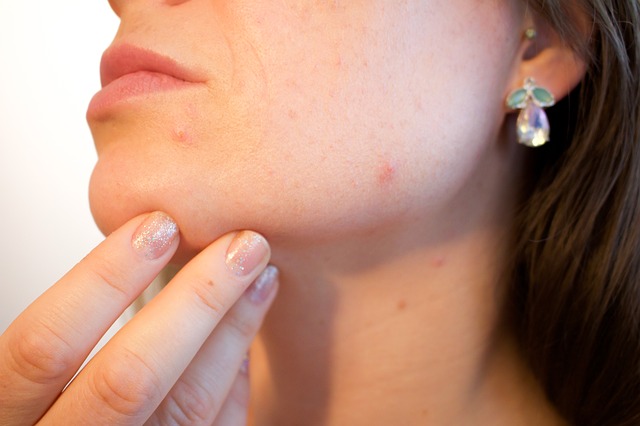COVID-19 has made us all have to make some sort of change to our lives. Wearing a face mask is one that we all need to do now to keep ourselves and others safe. But ever since face masks became a mandatory part of life, a nasty side effect has come about: ‘Maskne.’ The new phrase — which combines the words “mask” and “acne”.
Dictionary.com defines it as:
Maskne is acne or other skin irritation that results from wearing a mask, especially a medical, N95, or cloth face mask.
‘Maskne’ is a very real thing now, thanks to COVID-19! Mask acne or ‘maskne’ happens when sweat and skin oils and bacteria become trapped on the skin while wearing a mask. If you need to wear a face mask for hours every day, you may have noticed your skin starting to react. This unfortunate side effect can occur around your mouth, cheeks, and jawline.

Face masks can cause irritation by either physically rubbing against the skin, which can damage the skin’s protective barrier, or by trapping moisture, which can cause acne.
This type of acne is actually called acne mechanica which refers to any skin irritation that is formed by excess pressure, heat, and rubbing against the skin. When the skin is constantly rubbed, it starts to become rough and then acne can develop. It often happens when people wear helmets or hats that rub along the forehead, temples or a strap on your chin. It’s different from other kinds of acne (such as hormonal acne) because it occurs only in areas where the mask sits against the skin.
Healthy skin has a microbiome that loves to be balanced and has normal amounts of microorganisms, but when pores become clogged because of excess sweat and moisture from the mask, these organisms can overgrow and lead to bad bacteria, which lead to pimples.
Now, something to consider too is with the colder and drier winter air coming soon, we really need to take care of our skin. The mask rubbing against our dry delicate skin can create friction and cause the skin to crack, which then leaves open skin for the bad bacteria to enter and cause more acne. (Groan!!)

Can you prevent maskne?
Whether you’ve had maskne already or not, including these steps may help to prevent more pimples from forming.
Wash your face regularly – Start by making sure you wash your face at least twice a day, especially before and after wearing a mask. Use a mild gentle cleanser free of toxic chemicals, because not only is your skin absorbing those toxins, but now you are breathing those in while wearing your mask. Harsh foaming cleansers can strip the skin’s natural protective barrier and damages the skin’s microbiome. Choose clean, natural and toxin-free cleansers. Try my Refreshing Cleansing Lotion or Sweet Dreams Cleansing Oil.
Apply moisturizer – After washing your face, you want to prevent dryness and repair the skin’s natural protective barrier. Apply a serum and moisturizer or just a moisturizer, but make sure there are some nourishing oils in there to feed your skin. See the options below.
Skip the makeup – Wearing too many products under the mask can cause a buildup on the skin. You can still rock out your eye makeup but stay away from any extra layers on the skin under the mask at this time.
Pick your masks carefully – Unless you work in healthcare and you need to wear the necessary masks, choose a soft, cotton mask to reduce rubbing and irritation and allow your skin to breathe. Make sure it is a comfortable fit, so it doesn’t rub. Avoid synthetic masks as they can cause more irritation. Be sure to make sure that when you put on or remove your mask, you’ve cleaned your hands first!
Make sure you wash your mask after every use – Most importantly, the reason we want them to be clean is to prevent the spread of COVID-19, but also to remove any acne-causing bacteria and oils from the mask. Use hot water, laundry detergent, and a little vinegar which has antibacterial, antiviral and antifungal properties. Make sure to look for a laundry detergent that is fragrance-free and without colors, because you guessed it, they both cause irritation to the skin. Then hang to dry overnight.
The most important thing you can do when it comes to maskne is to pay attention to how your skin is reacting to wearing a mask. Take note if you feel like moisture is building up under your mask or if your skin feels irritated or tender. If you are able, find a spot away from others, remove your mask, pat dry any moisture on your face, and let your skin breathe for a few minutes. Your skin will appreciate the break. An antibacterial mask spray can definitely help too; it refreshes your mask and soothes your skin as well as your mood. Try my Cloth Mask Refresher Spray, it’s a great spray using antibacterial essential oils as well as alcohol to refresh your mask during the day.
How do you treat maskne?
Being loving and kind to your skin is the best treatment you can give it. Look for natural solutions, something with soothing and healing ingredients.
Start with the inside – what we eat should be clean too, as it has a big effect on our skin. Drink lots of water to hydrate your new skin cells forming under the skin surface, and eat anti-inflammatory foods such as vegetables, fruits, clean proteins, healthy fats, whole grains and legumes. Stay away from refined and pre-packaged foods.
Hydrate and moisturize – In addition to your twice-daily washing, the next important step in your skincare routine that can help maskne is a hydrating moisturizer. You want something that delivers hydration, but also moisture that comes from natural plant-based oils. My Rejuvenating Anti-Aging Facial Serum and Renewing Facial Elixir are great natural serums. Also, my Calming Chamomile and Lavender Facial Cream, Revitalizing Anti Aging Day Cream and Night Cream are great hydrating moisturizers.
Spot-treat the spots -If you’re already experiencing some mask-related pimples, you can use a spot treatment gel on them. Make sure it is not too drying and will still leave your skin hydrated. Try my natural Tea Tree Acne Spot Treatment Gel.
Use acne-treating products – If you have acne-prone skin, to begin with, then it’s especially important to include natural acne-prone products in the fight against maskne. I will be adding these onto the website very soon.
Create a barrier. When maskne shows up as skin irritation around the edge of your mask, you may need a “barrier” product to protect your delicate skin. Stay away from products like Vaseline or other petroleum-based mineral oils, as they won’t help to support a healthy microbiome. Use pure plant-based oils such as shea butter which will offer a healthier barrier for dry & irritated skin, as well as pure essential oils rather than synthetic perfumes or fragrances. My Facial Soother Cream is amazing for extremely dry skin, or my Soothing Calendula Butter is a great option to form a barrier.
Using a nourishing, hydrating or deep cleansing and detoxifying dry face mask free from preservatives is another excellent way to help feed your skin with excellent natural foods to slightly exfoliate, soften and clean the skin. My dry face masks are full of fruit powders that contain enzymes to help break down bonds between dead skin cells and the surface of the skin, clays that help to draw out impurities, and goat’s milk powder which is full of vitamins and lactic acid which is natural AHA (alpha hydroxy acid) providing light exfoliating properties.
Being gentle and careful with our skin now is even more important. It has a way of telling us that something is not right, by listening and responding naturally you will be on the road to healthier and happier skin.
Here’s to your health,

